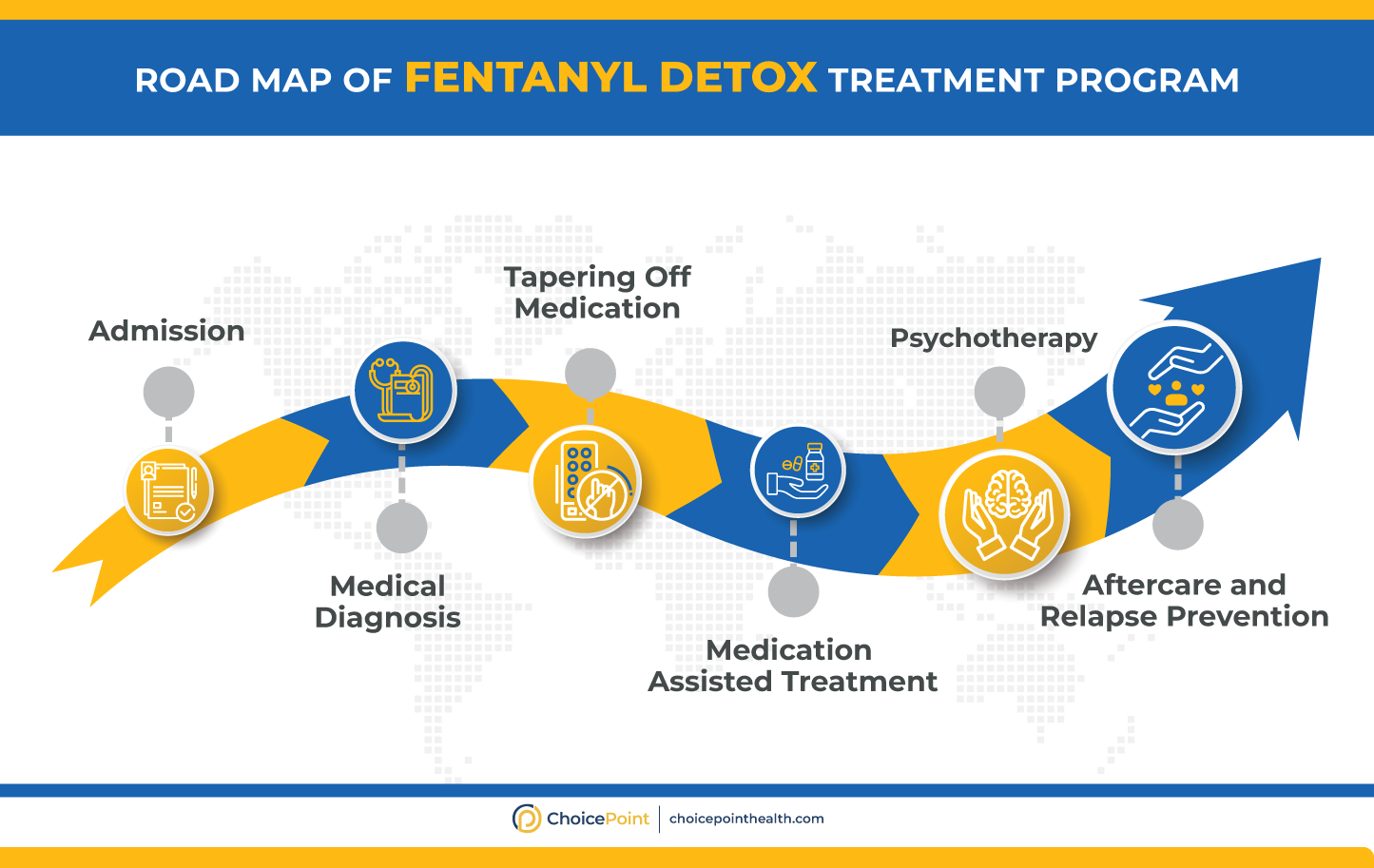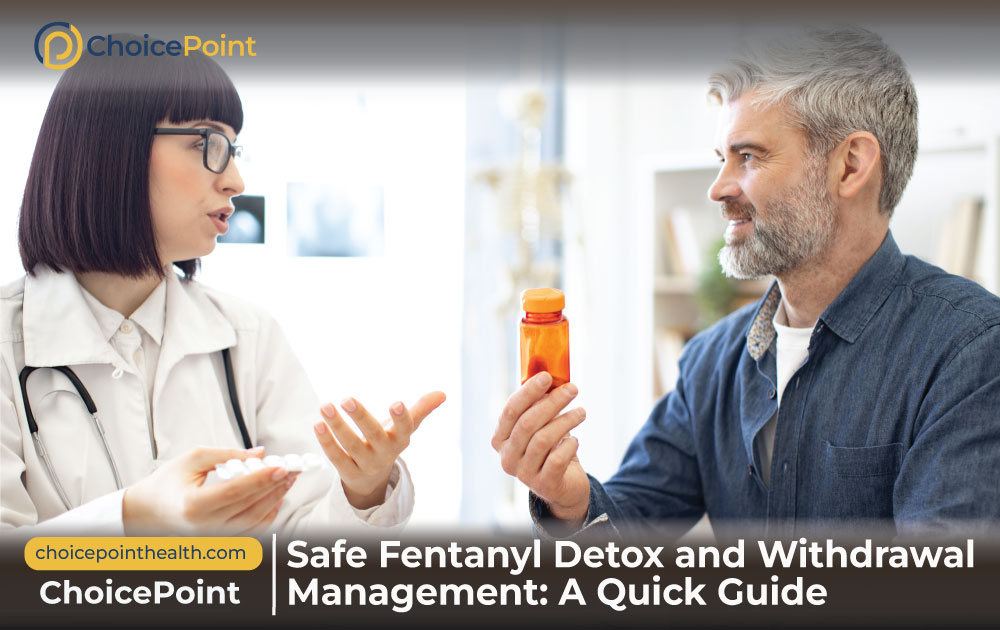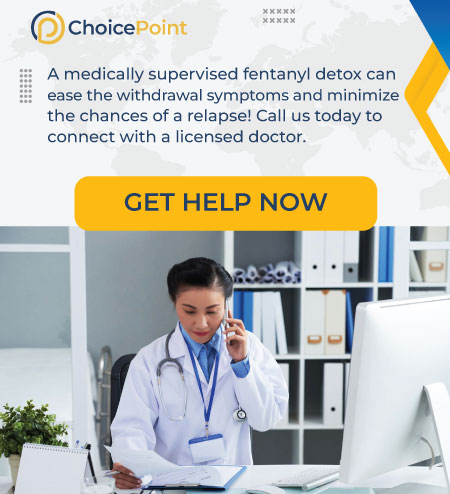Fentanyl is considered a miracle drug in pain management but has a high abuse potential. Did you know that overdosing on only 2 mg of Fentanyl can cause certain death? A huge risk of overdose calls for a medically supervised safe withdrawal. Read on to find out how to safely detox from fentanyl with minimal discomfort associated with withdrawal symptoms.
Fentanyl addiction is fatal but treatable. Please call us at 844.445.2563 to connect with a licensed doctor of ChoicePoint.
Table of Contents
What is Fentanyl? Use and Abuse
Fentanyl is a synthetic opioid used to treat severe pain, typically after surgery. It is a highly potent drug, also prescribed for pain management in individuals who have developed tolerance to other opioids. There are two types of fentanyl:
- Pharmaceutical fentanyl – Sold under brand names such as Actiq®, Sublimaze®, and Duragesic®.
- Illegal fentanyl – Street Names include Apache, Jackpot, Dance Fever, etc.
Fentanyl has high abuse potential. It is a schedule II narcotic, which means prolonged use can lead to drug dependence and addiction.
Signs of Fentanyl Abuse
If you are worried that you might be developing an addiction to this drug, you can look for these signs of fentanyl abuse:
- Consuming more than the recommended dosage
- Continued use even when symptoms under treatment have subsided
- Using illegal means to acquire fentanyl
- Spending substantial amounts on acquiring this drug
- Craving the drug
- Experiencing intense withdrawal symptoms when trying to quit
Still confused if you are suffering from Fentanyl addiction? A free addiction self-evaluation test is also a great way to find out.
Why Fentanyl Detox? Dangers of Fentanyl Addiction!
Fentanyl is 50-100 times more potent than Morphine. It can have fatal negative consequences when consumed in large amounts. Continued use may lead to addiction. The dangers of Fentanyl addiction include:
- Drug Overdose that may lead to coma or even death
- Hypoxia (Low oxygen to the brain)
- Respiratory depression
- Drowsiness
- Nausea and vomiting
Hence, to prevent the negative physical and mental health outcomes of Fentanyl addiction, you mustn’t delay your treatment.
Are you searching for a Fentanyl detox center near you? Call us at 844.445.2563 to explore safe and effective detox options.
How to Safely Detox From Fentanyl? Everything You Need To Know
Detoxing from Fentanyl is the first step toward recovery. It is also considered to be the most difficult stage by some because abstaining from drugs can be hard. The good news is that a safe detox with minimal discomfort is possible with the correct strategies!
How Long Does it Take to Detox from Fentanyl?
In addiction treatment, no one size fits all. Detox depends on several factors, including the severity of addiction, patient commitment toward recovery, and the duration of substance abuse. Generally, Fentanyl detox can last anywhere between 10 days to a couple of weeks. But detox alone is not sufficient. A comprehensive addiction treatment plan is essential to address the causes and effects of addiction for long-term recovery.
At-Home Fentanyl Detox Vs. Medical Detox
Many people attempt to quit Fentanyl cold turkey on their own. They fail to understand that leaving cold turkey increases the chances of a drug overdose, which may lead to respiratory distress, coma, or even death!
Furthermore, during drug abuse, the body begins to depend on the drug for normal functions such as emotional and physical regulation. Thus, when you abstain from drugs, the body reacts and undergoes a series of adjustments resulting in withdrawal symptoms such as:
- Respiratory depression
- Intense drug craving
- Anxiety
- Dilated pupils
- Insomnia
- Headache, along with muscle and bone pain
These symptoms are difficult to manage on your own. So, if you are thinking about how to detox from Fentanyl at home, please reconsider your options. You can safely withdraw from Fentanyl at a detox center under completely supervised, confidential, and compassionate care.
Medical Detox Is A Safe Fentanyl Detox Option
In a detox center, experienced DEA-certified doctors offer supervision, support, and medications to manage the withdrawal symptoms associated with drug abstinence safely. Depending on the severity of your addiction, you may be recommended to an outpatient or inpatient detox center. You can expect the following:
Commonly Prescribed Medications In A Detox
In MAT or medication-assisted treatment, a licensed doctor prescribes FDA-approved medications to ease detoxification. These medications act as opioid antagonists to help you manage cravings and withdrawal symptoms.
Some medications that may be prescribed include:
- Lofexidine – Used to manage opioid withdrawal symptoms
- Buprenorphine -Ease withdrawal symptoms and reduce cravings
- Naltrexone – Prevents Fentanyl to attach to the opioid receptor, thus blocking its effects.
- Suboxone – Used in both initial and maintenance phases to manage withdrawal and reduce cravings
ChoicePoint offers an online prescription program for some medications. Call us at 844.445.2563 to know if we can prescribe medication for you.

Detox for Fentanyl Withdrawal Symptoms
How Long Does Fentanyl Withdrawal Last?
Now that we have presented an overview of detox treatment, you might have additional questions. Most people inquire about the duration of withdrawal symptoms.
The duration depends on several factors including:
- Severity of drug dependence
- Duration of abuse
- Co-dependence on any other substance
- Overall health condition
- Age
Generally, you can expect the following withdrawal timeline:
1. Within 12 hours of abstinence, Withdrawal symptoms may begin.
2. Day 1-7: Withdrawal symptoms may peak
You may experience intense symptoms including:
- Drug craving
- Anger
- Insomnia
- Loss of appetite
- Irritability
3. After 7-10 days, Symptoms become less intense. You may start to feel better.
4. Protracted Withdrawal (Beyond 10 days): Fentanyl addiction takes a toll on mental health. Some symptoms persist after acute withdrawal. Depression and anxiety are among the common protracted withdrawal symptoms. These may take months to subside.
2. Non-Medical Withdrawal Management Options
Did you know that therapy is a great way to help you commit to quitting drugs? Several pieces of research support the benefits of behavioral therapies in the treatment of substance use disorder:
- Cognitive Behavioral Therapy – Helps to improve your thought process and identify patterns of addiction.
- Dialectical Behavioral Therapy – Helps identify and accept your negative behaviors and aims to change them into positive ones.
- Family Therapy – Aim to involve family to help you commit to recovery.
- Group Therapy – Aims to build a support group to help you recover.
- Individual Therapy – Recover in a confidential environment.
Fentanyl Withdrawal Management: What Is Next?
A common myth is that detoxification is enough for recovery. You must be mindful that only a complete addiction treatment plan will contribute towards life-long sobriety. Some approaches that complement a detox for a complete recovery include
Holistic Care For Fentanyl Addiction
Holistic addiction treatment programs aim to treat the person as a whole to foster growth and mental healing, along with drug abstinence. A comprehensive care plan combines medical detox with solution-based therapy and counseling to set the foundations for sustainable recovery.
Continued Support And Relapse Prevention Program
Relapse prevention plans are a great way to maintain sobriety after a detox. Some key features include:
- It helps to identify and cope with addiction triggers.
- Formulate a plan to resist drug temptations.
- Equips you with strategies to transition to real life after inpatient detox rehab
- Helps you to set achievable sobriety goals.
- It helps you identify and manage the warning signs of imminent relapse.
In addition, continued support promotes accountability to abstain from making unhealthy choices.
Don’t Battle Addiction Alone! Recover With Fentanyl Detox Center Near You
We understand that addiction can be ruthless. It can hinder daily activities, affect relationships, and lead to various mental health issues. People suffering from addiction usually isolate themselves from social activities, thus diving deeper into the cycles of addiction.
If you or a loved one is battling addiction, please know that complete sobriety is possible. ChoicePoint is a leading drug detox and addiction treatment facility that aims to help people overcome addiction through compassionate, holistic, and individualized addiction treatments.
Please call us at 844.445.2563 today, and together we can build a better tomorrow!
Frequently Asked Questions About Fentanyl Detox
People often ask us these questions about Fentanyl detox.
Why Are Opioids Addictive?
Opioids are used for pain management. They are also known to produce euphoria, which traps a person into taking more than prescribed doses. They trigger the brain’s reward system to produce false feelings of happiness and calm. However, these effects are short-lived. Individuals soon develop tolerance to the opioids and start craving greater doses, which leads to addiction.
How Is Fentanyl Different from Other Opioids?
Fentanyl is much stronger than other opioids and has a shorter duration of action than other opioids.
How Do You Find a Fentanyl Detox Center Near You?
To find a Fentanyl detox center near you, you can explore the following options:
- Look into addiction treatment directories
- Call addiction treatment helplines to get a list of nearby addiction treatment centers.
- Look into virtual addiction treatment programs for support and queries.
How to Detox from Fentanyl at Home?
Fentanyl detox at home can be hazardous. Individuals can relapse or overdose on Fentanyl when trying to quit cold turkey. Furthermore, the withdrawal symptoms are difficult to manage on your own. It is safer to detox in a medical setting. To schedule an appointment, please call us 844.445.2563.
Does Insurance Cover Fentanyl Addiction Treatment?
Yes, most insurance companies cover fentanyl addiction treatment. If you are unsure about your insurance coverage, you can verify online.
Medical Disclaimer:
ChoicePoint aims to improve the quality of life for people struggling with substance use disorder and mental health issues. Our team of licensed medical professionals research, edit and review the content before publishing. However, this information is not intended to be a substitute for professional medical advice, diagnosis, or treatment. For medical advice please consult your physicians or ChoicePoint's qualified staff.
Somebody essentially lend a hand to make significantly posts I might state That is the very first time I frequented your web page and up to now I surprised with the research you made to create this particular put up amazing Excellent job











My brother recommended I might like this web site. He was totally right. This post actually made my day. You cann’t imagine just how much time I had spent for this information! Thanks!